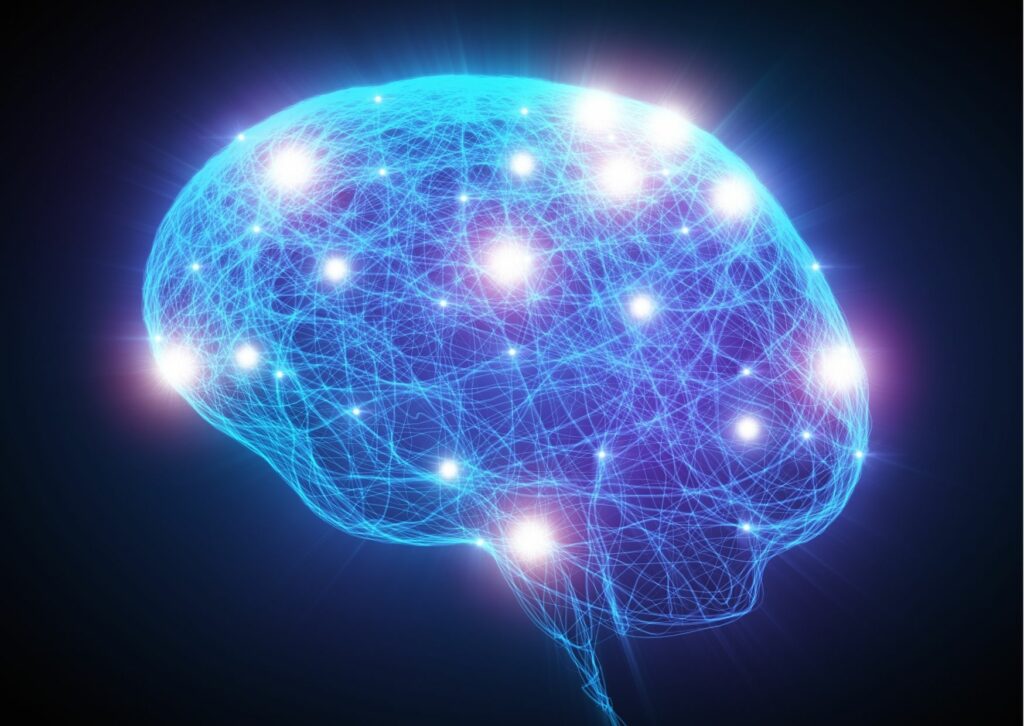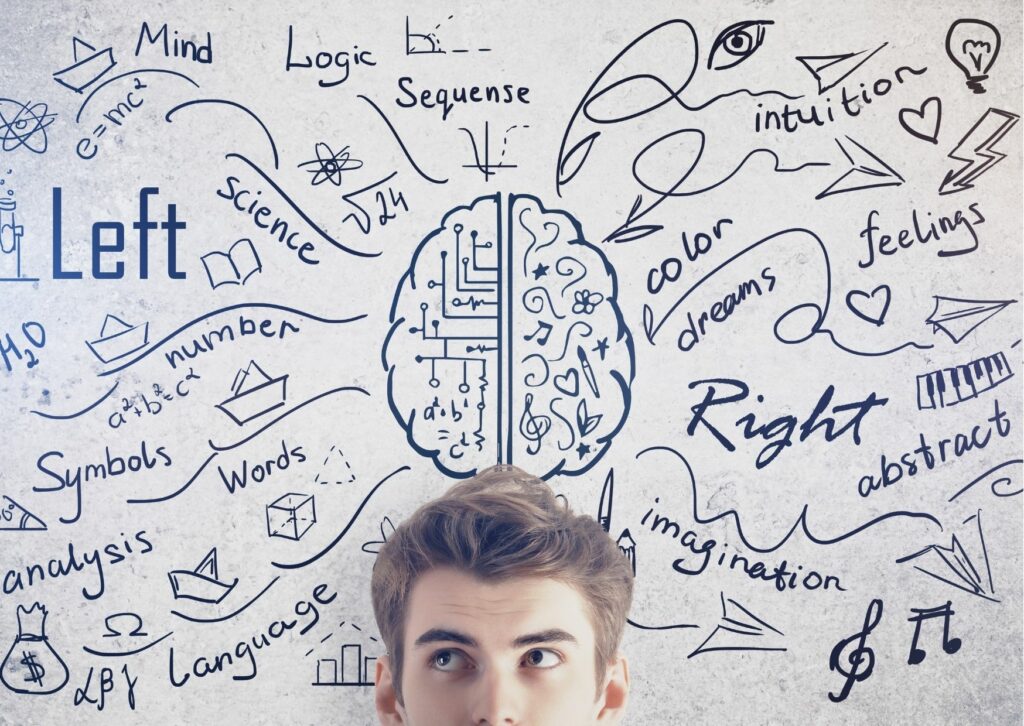Mathematics and the human brain
In one of my math classes, our professor mentioned some interesting studies by John Von Neumann and when I researched further, I found a study where he showed connections and similarities between our brain and mathematics. I have been studying mathematics for 7 years now, and lately, my interest in the connection between the brain and my field of study has increased. Given the complexity of our brain and the large number of calculations it performs in a short period of time, I became all the more curious to look into it more deeply.


How the brain works is still a mystery to many today. The human brain has a complex structure: to grasp the scope of this computing machine, one must realize that the brain is a vast network of densely interconnected cells consisting of about 171 trillion brain cells - about 86 billion neurons and another 85 billion non-neuronal cells. Between the neurons alone, there are about 10 quadrillion connections - that's a 10 followed by 15 zeros.
I'm going to give you a little task.
Imagine biting into a lemon. How does that feel?
Even if you just imagine biting into a lemon, you have that sour taste in your mouth, you start producing saliva and immediately remember what it feels like.


But how can our brain recall memories and connections at any time?
So I did some more research on the connections between our brains and math and well...I googled first. Rick Hugainr, Direktor des Johns Hopkins Department of Neuroscience, mentioned in a study, memory as a neuronal connection. Memories are who we are," says Huganir. "But the formation of memories is also a biological process".
He also mentioned, that even when we learn something as simple as a person's name, we make connections between neurons in the brain. These synapses create new circuits between neurons, essentially rearranging the brain. The sheer number of possible connections gives the brain unimaginable flexibility - each of the brain's 100 billion neurons can have 10,000 connections to other neurons.
Surprisingly, researchers are now exploiting the properties of certain types of cortical neurons and processes in the field of deep learning and artificial intelligence.
Our second brain hemisphere provides us with a brief change of pace - this is where emotions are primarily processed.
But how does the left brain perform compared to the right?
Our brain can essentially be divided into two areas - the rational brain, which is controlled by the prefrontal cortex, and the emotional side, which is controlled by the limbic system. All decisions related to goal setting, problem-solving, and planning are influenced by our prefrontal cortex, which is the rational brain. But the moment you get angry because someone was mean to you is more a task of your emotional brain.
There are some interesting theories about these distinctions.


The theory of the Elephant and the Rider
Jonathan Haidt, a psychologist at New York University, compares an elephant to the emotional side of our brain and the rider to its rational side.
It may seem that the rider is usually in charge and controls the elephant, but whenever a conflict arises between the two, the elephant wins.This theory is a metaphor for the emotional and the rational side.
Task: Can you imagine eating a chocolate cake in the middle of the night? Or putting off a confrontation to watch Netflix?
This is our emotional side winning over the rational. Behavioral changes occur when the elephant and the rider move together to achieve the goal. As the saying goes: "Direct the Rider, Motivate the Elephant, and Shape the Path"


Can my brain be reprogrammed for positive change?
There are so many other examples that confirm that people can reprogram their minds with strong positive emotions.I recently came across the book "The Choice" by Dr. Edith Eger. She was deported to Auschwitz in 1944, when she was 16 years old. Today she is 94 years old, a psychologist and has dedicated her career to treating patients suffering from post-traumatic stress disorder.
*Successful psychologist and world-renowned speaker Dr. Edith Eger is one of the last survivors of the Holocaust. Her harrowing story is a deeply moving testimony to the triumph of humanity over hatred and shows us that in life we always have the freedom to choose. In 1944, at the age of 16, Edith Eger was deported from her native Hungary to Auschwitz. There she had to suffer unimaginable things: She saw her mother go into the gas chamber and afterward had to dance in front of Josef Mengele. It's a miracle that Edith survived the horrors of the National Socialist camps. In the USA, she built a new life for herself alongside her husband and became a psychologist and therapist. *
"Suffering is universal", says Edith. She adds: "Being a victim is optional. Victimhood comes from within. We don't become victims because of what happens to us, but if we choose to hold on to our victimization. A victim would normally say - why me? But a survivor would say, "What now?". She believes that her mind cannot be controlled by anyone but herself..
There is more scientific evidence that our brains can adapt to change throughout our lives. As the name suggests, neuroplasticity refers to the brain's ability to adapt.
It refers to the physiological changes in the brain that happen as the result of our interactions with our environment. From the time the brain begins to develop in utero until the day we die, the connections among the cells in our brains reorganize in response to our changing needs. This dynamic process allows us to learn from and adapt to different experiences.
When we learn something new, we can establish new connections between our neurons. In this way, our brain becomes attuned to new situations. Studies have shown that we can also stimulate the process of rewiring ourselves. The term was first formulated by Polish neuroscientist Jerzy Konorski in 1948 to describe observed changes in neuronal structure and to reconnect the circuits in our brain.
Now the next big question arises: Can we rewire our fear-related memories or traumatic experiences and form new brain connections? Research into neuroplasticity has shown us, that our daily behavior can have measurable effects on brain structure and function,which can enable healing and recovery from psychiatric disorders(Hellerstein, 2011).
A combination that makes the difference
The Emotional Training Program consists of various elements: Harmonies, Affirmations, Relaxation Exercises, and Negative & Positive Scenes (for addiction programs only).
The Harmonies are powerful emotional exercises that reduce anxiety and stress, boost self-confidence, and stimulate metabolism. The spoken visualizations and the film music composed especially for them trigger strong emotions in the listener and lead quickly and permanently to a positive change in behavior.
Why does this combination work?
There is a lot of scientific evidence that visualization, affirmations and music have a great impact on our brain, and our thoughts.
Affirmations:
„Whatever we plant in our subconscious mind and nourish with repetition and emotion will one day become a reality.“ – Earl Nightingale
And here are additional important rules for formulating your personal affirmations;
Only formulate the affirmation in the present.This is because the subconscious mind also understands formulations in the future accordingly - as something that should happen in the distant future, but not now or today.
Wrong: I will succeed.
Right:I am on the road to success. Or: I am successful in everything I do.
Do not use negations. Because the subconscious mind is not able to classify a negation.
For example, if I say : Think now of a pink elephant; you'll immediately see a pink elephant in front of your inner eye ...
Wrong: I am not afraid.
Right: I am strong and self-confident.Wrong: I am no longer sad.
Right: (for example) Happiness is only within me.
To find out more, you can buy Dagmar Herzog's e-book "The power of emotions" or "Mental slimming training".
Visualization
"What you imagine, you create." -Buddha
Your subconscious mind responds well to images. Visualization is a great way to program your mind with positive, encouraging images. Try spending 10-15 minutes a day imagining positive scenes that show you and your life experiences.
Here's a quick visualization you can work with:
"I imagined images that meant absolute joie de vivre for me, e.g. walking along the beach, breathing clear air, perceiving the colors of the water, feeling the sun on my skin, moving freely and safely, eating a salad in a beach café and drinking a sparkling cool glass of mineral water, liberated, exhilarated, happy. The subconscious is reprogrammed with these positive scenes, because in the positive scenes, drinking tea or exercising in nature is experienced in conjunction with feelings of happiness. "
Music
According to studies, music has various positive effects on our brain, such as the following.
- Increased creativity and cognitive enhancement
- Reduction of anxiety and improvement of mood
- Help in entering a meditative state
- Improved sleep habits
- Improvement of concentration, attention, and memory
We have for you a fragment from our emotional sleep training:
You can listen to it before you go to sleep, lie down in bed with your eyes closed, and try to listen to it for 15 minutes.
To learn more about how music affects our brain and how it is integrated into our training. Read our article - The Power of Music to get a better understanding.
Finally, I would like to share with you the experience of one of our users, Gabi. P.K. She has worked with the Anti-Anxiety & Depression Training and used its elements to improve her habits and her feelings to reprogram her brain in the long term.
Katrin (00:00)
Now I think at the beginning I would very much like to know what was your personal situation when you decided to start the anti-anxiety and depression training. Maybe you can tell us a little bit of the background story and how it actually happen that you then discovered the Herzog method.
Gabi (00:17)
Well, I came across the Method 26 years ago and lost 18 kilos in 4 months through mental slimming training and within one weekend my self-confidence increased so much that friends and acquaintances immediately talked to me about it. So that was quite a crazy experience. I was nervous before and had no self-confidence and after that weekend I was a completely different person. I changed my life completely at that time. It was perfect for six years. I had incredible energy, was very happy and content. And then within a short period of time so many things happened that completely knocked me down. Then I started eating uncontrollably again, just wanting to suffer and be pitied. So I think everyone knows the situation. And although I would have known how to get out of it with the Herzog method, I preferred the suffering path at that time. Now, two and a half years ago, I was in such a situation again. My husband, the love of my life, passed away after 12 years of serious illness and I cried an incredible amount, I was totally desperate and would have preferred not to get up in the morning.
Gabi (01:45)
After almost a year of intense mourning, motivated by a conversation with Dagmar Herzog, I started again to listen and especially to feel the Harmonies.
Katrin (01:56)
I find that quite exciting and let's start with the program itself. How did you incorporate it into your daily routine? How often did you do it? Is there a ritual for you? Maybe we'll start with that.
Gabi (02:07)
So I then did the program every day, although I actually mostly preferred to listen to "Walk in the woods" Harmony. In my head, I did this walk with my husband in spirit. So he was always there and I still imagine that when I listen to it. I see him, I feel him and I am unspeakably happy.
Katrin (02:33)
Would you say that this feeling that he is still there with you is the anchor that doesn't let you slip?
Gabi (02:41)
Exactly, I then just simply believe he is always with me and feel it very intensively in this exercise. And I know that he is always with me and that is just an incredibly beautiful, reassuring feeling that lets me simply live life again the way I used to.
Katrin (03:07)
Yes, I can understand that. And is it that you do it once a day? Or do you do these exercises several times? Is there something you still do in the evening? Or do you say that once a day is enough for you?
Gabi (03:20)
Yes, well, once a day was enough for me. That's because I did it extremely intensively 26 years ago. And I really did it properly then. And I actually did it for six years, because I didn't want to miss it anymore. It was just such a great feeling and that always put me in such a satisfied and happy state and brought so much energy that I really did six years always. And that was now of course, even if there was a long time in between, very helpful because I got back into it extremely quickly.
Katrin (04:00)
And if we go back 26 years to the beginning, it was very much the case that you followed the recommendation very closely, i.e. that when we still held the seminars in the evening. If you were to give a tip to people starting out now on the subject of "How do you do it?" What would you tell someone?
Gabi (04:23)
Yes, well, I was very adamant about it back then. I did it in the morning. I did it in the evening. Just like Dagmar had recommended back then. And I did everything according to plan with the affirmations, but I had already internalized it. I can remember. I had done a seminar on Saturday, Sunday, and Monday, and one of my main problems was a lack of self-confidence. And in the night from Sunday to Monday, my husband woke me up and said, "What's wrong with you? You keep talking in your dreams, and you keep saying I'm strong and confident. Nobody can hurt me." So that really happened, I internalized it, and it worked. It really worked very quickly.
Katrin (05:21)
Okay, that was very nice. A nice transition to the next question I have, and that is that you said in the second program that after one weekend there was already feedback from outside that something was different. Your husband woke you up, but there was also a change in your environment. In other words, your behavior towards other people. Maybe let's start with the program 26 years ago, because that's when you simply started over. I can well imagine that it happened very quickly the second time around. But tell us what it was like back then, when people started to react differently to you or that they noticed that something had changed about Gabi.
Gabi (06:05)
So it was after the first time listening to this harmony I was already so deep in the emotions that already the next day I felt only a fraction of the sadness. That happened very quickly. I found a way for me to cope or deal with the sadness. And through the feelings of happiness, which I experienced through the harmony, and through the belief in life after death, I have found a wonderful way to deal with grief in such a way that I have completely turned my life around again, as I did 26 years ago.
Katrin (06:45)
And then, did the program have a lasting impact on you?
Gabi (06:50)
Yes, so my work fulfills me totally again. And despite or because of Corona, I see that I am doing well, that I am doing the things that bring me joy, like good conversations with dear friends, singing, laughing, dancing, making music, seeing and feeling nature. And because I am very happy and content, it is also possible for me to help people around me. I do that whichever way I can and that is an incredibly nice feeling. I am constantly asked about it and also I have learned to let go again. It is a very important part of the method and through it, I could lose weight from the beginning of the training. And then one kilo every month. At the moment I lost twelve kilos already. That's not as fast as the first time, but I'm not 35 anymore.
Katrin (07:48)
It is also not necessary that it happens so quickly. Very nice! And that is visible to people around which is somehow the best proof.
Gabi (07:59)
Yes, but also the radiance and happiness that people in my life and everyone around me notices. It's really, it's become incredibly great again and I would never have thought that I would enjoy life so much again.
Katrin (08:18)
That's a really great story. Do you believe in the effect of the emotional training program?
Gabi (08:30)
I do not believe it. I know it.
Katrin (08:33)
The best answer to the question I think. And would you recommend the program to others with similar problems like stress, anxiety, who are also struggling with a similar background?
Gabi (08:49)
Yes, what a question, of course. It's an incredible feeling when you manage to do it with the help of this method and still always have the feeling that you've done it yourself. Yes, it makes a difference whether I go to a therapist for weeks, months or years who pulls it out of me, doesn't it? I then have the feeling that I've done it myself. Yes, with the help of this method, it's an incredible feeling. And it's also the other components of the method, such as the affirmations, a different evaluation of situations and ultimately letting go, that have brought me to the point where I can now look back on the wonderful time with my wonderful husband with gratitude, but without sadness, and still be able to love the people who are with me again.
Katrin (09:49)
I would still like to know: was there a moment when it was difficult to convince yourself? Did you have many moments in which you somehow had to, let's say, persuade yourself to do something? Or was that relatively quickly, that it was so deep inside you emotionally, that it wasn't necessary at all? So these moments, sometimes you know that you still have to pull yourself together to do sports from time to time. Did you have that too, or was that never the case?
Gabi (10:20)
Now, when it comes to food, to really letting go and just really doing what you want, I got into that very quickly. I can remember that. One Sunday 26 years ago, we were in a café after training and I ordered only a cappuccino. Then Dagmar said, "she's got it". Yes, I've never forbidden myself anything. And I've also lost those twelve kilos in the last year. I really have a phase once or twice a week in the evening where I want this and that and yes, I'll do it. But on the whole, my day really runs in such a way that I only eat when I'm hungry. That's usually at 2 o'clock in the afternoon or whatever it is, between two and six o'clock. And yes, it's simple: I trust my body and it does that.
Gabi (11:27)
And if I have a day that's not so great, then that's just the way it is. And it still works. It's just really important to regain confidence in yourself, in your body and in life. To know that life simply means you well. You just have to see it. And yes, then you can also do these exercises. I was so adamant about doing them at the beginning. I did them at two in the morning when I went to bed late. It was simple, the day wasn't finished until I did it. And that made me get up in the morning feeling cheerful and full of energy again. It's simply part of my life again now. And I'm very grateful for that. Again and again. I have already recommended it to many others. One thing that perhaps comes to mind is that I've always thought um, what I've always thought over the years. It's such a shame. This method actually belongs in every elementary school or early secondary school, so that children learn right from the start how great they can work with the subconscious. And their whole life would be completely different and much easier.
Katrin (12:52)
Yes, we believe it too, we have actually often sought initial contact with schools because we now also have a children's program. I believe that this is also a very important generational task. Wonderful. Well, thank you very much again, have a nice lunch.
Gabi (13:08)
Thank you too.
Katrin (13:09)
Please get in touch with us if anything will get worst again. Or if everything is okay and great. Thanks for your time.
Gabi (13:16)
Thank you Katrin.
Katrin (13:18)
Bye.
Gabi (13:19)
Bye.
If you are interested in our training,you can download the app here and try it out for yourself.
Related articles
Weight gain starts in the head
13 April 2023
The easy availability of food has resulted in an increase in obesity in the world population among adults and children for read more


Weight gain starts in the head
23 February 2023
The easy availability of food has resulted in an increase in obesity in the world population among adults and children for s read more


7 methods against Unproductivity in the home office
19 May 2022
While it was already everyday life for some people, many people had to adapt to working from home, especially at the beginning of Corona. Some did read more


